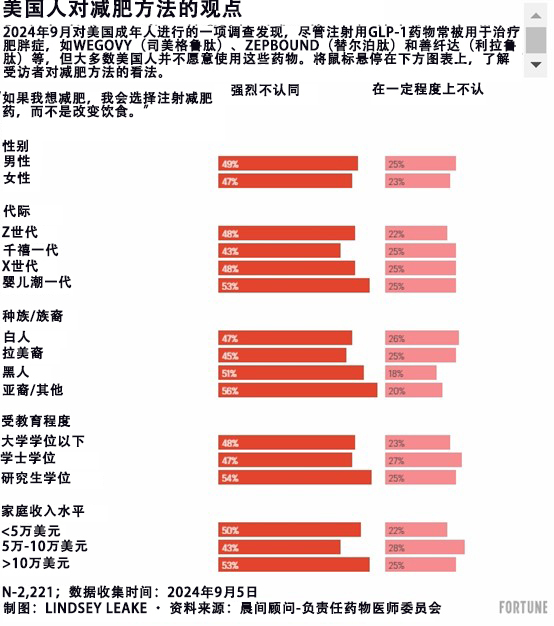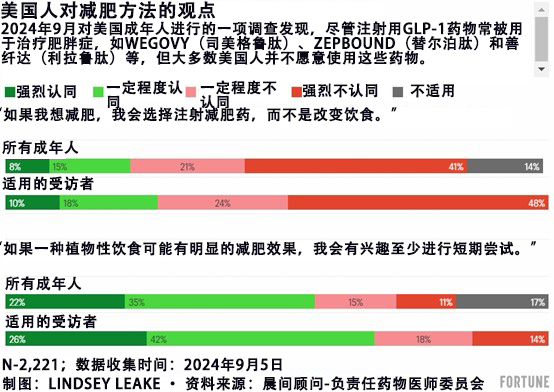
胰高血糖素样肽-1(GLP-1)激动剂药物似乎无处不在。最近几年,这类用于减肥和治疗2型糖尿病的药物,不仅变得家喻户晓,而且似乎人人都离不开它。供应短缺的新闻占据了媒体头条,到处都是单调的商业广告。GLP-1甚至颠覆了食品、服装和减肥行业。
但一项最新调查发现,尽管注射用GLP-1药物常被用于治疗肥胖症,如Wegovy(司美格鲁肽)、Zepbound(替尔泊肽)和善纤达(Saxenda)(利拉鲁肽)等,但大多数美国人并不愿意使用这些药物。
非营利组织负责任药物医师委员会(Physicians Committee for Responsible Medicine,PCRM)与商业情报公司晨间顾问(Morning Consult)合作,调查了2,200多名美国成年人对减肥方法的看法。调查在9月份进行,调查结果于10月8日发布。
受访者被要求对下面这句话的认同程度进行评分:“如果我想减肥,我会选择注射减肥药,而不是改变饮食。”超过一半(62%)的受访者不认同这种说法,有14%的受访者表示,这种说法不适用,因为他们不需要减肥。近四分之三(73%)的适用受访者不认同这种说法。
在有意减肥的受访者中,不认同这种说法最强烈的群体分别是:
• 男性:75%
• 婴儿潮一代:78%
• 亚裔或“其他”:77%
• 研究生学位持有者:79%
• 家庭收入超过10万美元:78%
• 城市居民:75%
• 东北部地区居民:77%
• 登记选民:73%
• 独立选民:74%
负责任药物医师委员会主席尼尔·巴纳德博士在关于这项调查的新闻稿中表示:“最新调查结果并不意味着美国人不想减肥。相反,大多数人更倾向于通过改变饮食习惯来减肥,而不是注射药物。”

虽然调查结果反映了公众舆论,但这个问题并没有体现出健康减肥的细微差别。虽然“热量赤字”是减肥的关键,但它终究只是整个拼图的一部分而已。基因、睡眠、压力、激素、体育活动和某些药物都会影响体重管理。个人病史也会产生影响。此外,虽然GLP-1被批准用于治疗肥胖症,但它适用于通过其他方式减肥存在困难的患者,而且应该结合饮食和体育锻炼使用。
旧金山加州太平洋医疗中心(California Pacific Medical Center)器官移植科肥胖药物与代谢健康项目医学主任妮莎·帕特尔博士正在努力推翻一种错误观念,即服用减肥药是一种轻松的解决方法。
帕特尔之前曾对《财富》杂志表示:“人们忘了,有一些强大的神经激素因素在起作用,这不仅使减肥变得困难,还使得长期保持体重更加困难。服用药物确实有助于维持平衡。它可以帮助阻断一些干扰性信号。”
尽管如此,使用GLP-1药物的依从性是个问题。8月份的《管理式护理与专业药学杂志》(Managed Care and Specialty Pharmacy)发表的一篇研究简报显示,只有三分之一(32%)的患者在一年后仍能坚持用药。按预期方式使用药物的患者比例更低(27%)。
植物性饮食对希望减肥的人很有吸引力
负责任药物医师委员会还调查了人们对下面这种说法的认同程度:“如果一种植物性饮食可能有明显的减肥效果,我会有兴趣至少进行短期尝试。”超过一半(57%)的受访者认同这种说法,有17%的受访者表示他们不需要减肥。在希望减肥的受访者中,超过五分之三(68%)的受访者认同这种说法。
在有意减肥的受访者中,认同这种说法最强烈的群体分别是:
• 女性:70%
• Z世代:81%
• 亚裔或“其他”:76%
• 大学和研究生学位持有者(比例相同):69%
• 家庭收入超过10万美元:70%
• 城市居民:75%
• 东北部地区居民:70%
• 登记选民:69%
• 民主党人:76%

(财富中文网)
胰高血糖素样肽-1(GLP-1)激动剂药物似乎无处不在。最近几年,这类用于减肥和治疗2型糖尿病的药物,不仅变得家喻户晓,而且似乎人人都离不开它。供应短缺的新闻占据了媒体头条,到处都是单调的商业广告。GLP-1甚至颠覆了食品、服装和减肥行业。
但一项最新调查发现,尽管注射用GLP-1药物常被用于治疗肥胖症,如Wegovy(司美格鲁肽)、Zepbound(替尔泊肽)和善纤达(Saxenda)(利拉鲁肽)等,但大多数美国人并不愿意使用这些药物。
非营利组织负责任药物医师委员会(Physicians Committee for Responsible Medicine,PCRM)与商业情报公司晨间顾问(Morning Consult)合作,调查了2,200多名美国成年人对减肥方法的看法。调查在9月份进行,调查结果于10月8日发布。
受访者被要求对下面这句话的认同程度进行评分:“如果我想减肥,我会选择注射减肥药,而不是改变饮食。”超过一半(62%)的受访者不认同这种说法,有14%的受访者表示,这种说法不适用,因为他们不需要减肥。近四分之三(73%)的适用受访者不认同这种说法。
在有意减肥的受访者中,不认同这种说法最强烈的群体分别是:
• 男性:75%
• 婴儿潮一代:78%
• 亚裔或“其他”:77%
• 研究生学位持有者:79%
• 家庭收入超过10万美元:78%
• 城市居民:75%
• 东北部地区居民:77%
• 登记选民:73%
• 独立选民:74%
负责任药物医师委员会主席尼尔·巴纳德博士在关于这项调查的新闻稿中表示:“最新调查结果并不意味着美国人不想减肥。相反,大多数人更倾向于通过改变饮食习惯来减肥,而不是注射药物。”
虽然调查结果反映了公众舆论,但这个问题并没有体现出健康减肥的细微差别。虽然“热量赤字”是减肥的关键,但它终究只是整个拼图的一部分而已。基因、睡眠、压力、激素、体育活动和某些药物都会影响体重管理。个人病史也会产生影响。此外,虽然GLP-1被批准用于治疗肥胖症,但它适用于通过其他方式减肥存在困难的患者,而且应该结合饮食和体育锻炼使用。
旧金山加州太平洋医疗中心(California Pacific Medical Center)器官移植科肥胖药物与代谢健康项目医学主任妮莎·帕特尔博士正在努力推翻一种错误观念,即服用减肥药是一种轻松的解决方法。
帕特尔之前曾对《财富》杂志表示:“人们忘了,有一些强大的神经激素因素在起作用,这不仅使减肥变得困难,还使得长期保持体重更加困难。服用药物确实有助于维持平衡。它可以帮助阻断一些干扰性信号。”
尽管如此,使用GLP-1药物的依从性是个问题。8月份的《管理式护理与专业药学杂志》(Managed Care and Specialty Pharmacy)发表的一篇研究简报显示,只有三分之一(32%)的患者在一年后仍能坚持用药。按预期方式使用药物的患者比例更低(27%)。
植物性饮食对希望减肥的人很有吸引力
负责任药物医师委员会还调查了人们对下面这种说法的认同程度:“如果一种植物性饮食可能有明显的减肥效果,我会有兴趣至少进行短期尝试。”超过一半(57%)的受访者认同这种说法,有17%的受访者表示他们不需要减肥。在希望减肥的受访者中,超过五分之三(68%)的受访者认同这种说法。
在有意减肥的受访者中,认同这种说法最强烈的群体分别是:
• 女性:70%
• Z世代:81%
• 亚裔或“其他”:76%
• 大学和研究生学位持有者(比例相同):69%
• 家庭收入超过10万美元:70%
• 城市居民:75%
• 东北部地区居民:70%
• 登记选民:69%
• 民主党人:76%
(财富中文网)
GLP-1s, or glucagon-like peptide-1 agonist drugs, are seemingly everywhere. In recent years, this class of weight-loss and Type 2 diabetes medication has become not only a household name but inescapable. Shortages have dominated news headlines, and singsong commercials have taken over airwaves. GLP-1s have gone so far as to disrupt the food, clothing, and, of course, weight-loss industries.
Yet despite the ubiquitousness of injectable drugs indicated for people with obesity—such as Wegovy (semaglutide), Zepbound (tirzepatide), and Saxenda (liraglutide)—most Americans wouldn’t take them, according to a new survey.
The nonprofit Physicians Committee for Responsible Medicine teamed up with business intelligence firm Morning Consult to survey more than 2,200 U.S. adults about weight-loss methods. Results of the poll, conducted in September, were released Oct. 8.
People were asked to rate their level of agreement with this statement: “If I wanted to lose weight, I would rather take an injectable weight-loss drug, rather than make a diet change.” More than half (62%) disagreed, with 14% reporting the statement didn’t apply to them because they don’t need to lose weight. Nearly three-fourths (73%) of applicable respondents disagreed.
Among people who were interested in weight loss, these groups most strongly disagreed:
• Men: 75%
• Baby boomers: 78%
• Asian or “other”: 77%
• Postgraduate-degree holders: 79%
• Household income exceeds $100K: 78%
• Urban dwellers: 75%
• Northeasterners: 77%
• Registered voters: 73%
• Independent voters: 74%
“The new findings do not mean that Americans do not want to lose weight,” PCRM president Dr. Neal Barnard said in a news release about the survey. “Rather, most would prefer to change their eating habits than inject a medication.”
While the results offer a snapshot of public opinion, the question doesn’t capture the nuances of healthy weight loss. A calorie deficit is a critical component of weight loss but ultimately just one piece of the puzzle. Genes, sleep, stress, hormones, physical activity, and certain medications can impact weight management. Your medical history also plays a role. What’s more, GLP-1s approved for people with obesity are intended for patients who’ve had difficulty losing weight by other means, and designed to be taken in conjunction with diet and exercise.
Dr. Nisha Patel, medical director of the Obesity Medicine and Metabolic Health Program within the transplant department at California Pacific Medical Center in San Francisco, is working to dispel the myth that taking weight-loss medication is the easy way out.
“People forget that there are some strong neurohormonal factors at play that make it difficult to not only lose weight, but to keep that weight off in the long term,” Patel previously told Fortune. “Medications have really helped level the playing field. It can help interrupt some of that disruptive signaling.”
That said, GLP-1 adherence is an issue. According to a research brief published in the August issue of the Journal of Managed Care and Specialty Pharmacy, roughly one in three (32%) patients were still on their medication after a year. Fewer than that (27%) took the drug as intended.
Plant-based diet appeals to weight-loss hopefuls
The PCRM survey also asked people how much they agreed with this statement: “If a plant-based diet might cause significant weight loss, I would be interested in trying it, at least briefly.” More than half (57%) of all respondents agreed, with 17% saying they didn’t need to lose weight. More than three in five (68%) respondents looking to lose weight agreed.
Among people who were interested in weight loss, these groups most strongly agreed:
• Women: 70%
• Gen Zers: 81%
• Asian or “other”: 76%
• College and postgraduate-degree holders (tie): 69%
• Household income exceeds $100K: 70%
• Urban dwellers: 75%
• Northeasterners: 70%
• Registered voters: 69%
• Democrats: 76%






